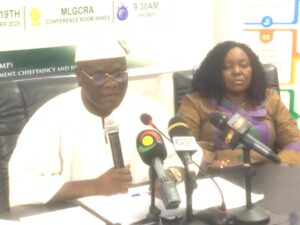Minister Urges Rapid Action on Toilet Access
Ghana must urgently accelerate its sanitation efforts and ensure that every household owns and uses a safe toilet, Minister for Local Government, Chieftaincy and Religious Affairs, Hon. Ahmed Ibrahim, has declared. He made the call on Wednesday during the national commemoration of the 2025 World Toilet Day held at the Ministry’s conference room.
Speaking to development partners, government agencies, civil society actors, and the media, the Minister warned that Ghana’s sanitation progress remains too slow for a lower-middle-income country and urged citizens, institutions, and local authorities to take responsibility.
This year’s theme, “Accelerating Change, Toilet for All, Everyone’s Responsibility,” he said, reflected Ghana’s urgent need for collective ownership of sanitation. “Sanitation improves human dignity, public health and economic transformation. Most importantly, it is every citizen’s responsibility,” he stressed.
Hon. Ahmed Ibrahim expressed concern that only 25% of households have basic sanitation facilities, according to the 2023 Ghana Statistical Service report. He noted with worry that 18% of Ghanaians still practice open defecation, with the Upper East, North East and Savannah regions recording the highest rates.
He warned that Ghana is lagging behind several West African countries that have made faster sanitation progress despite having fewer resources. The Minister attributed the slow pace to household reluctance to invest in toilets, inadequate funding for sanitation, weak enforcement of bye-laws, rapid urbanisation, and fragmented stakeholder collaboration.
He identified the growing perception that toilets are not a priority as a major barrier. “For many families, building a toilet competes with school fees, business capital, or housing extensions. We must change this mindset,” he said.
Hon. Ibrahim highlighted that over 85% of Ghana’s WASH investment goes into water, leaving sanitation underfunded. He also noted that more than 75% of urban households rely on on-site facilities, even as desludging services and treatment plants struggle to keep pace with Ghana’s rapid urban growth.
He emphasised that the country already knows the solutions—Community-Led Total Sanitation, revolving household toilet financing schemes, private-sector involvement, and behaviour change efforts—but must now scale up implementation with speed and commitment. “We must ensure no one is left behind—our northern regions, low-income urban settlements, island communities, and peri-urban neighborhoods must all be supported to own toilets,” he added.
The Minister charged households, traditional leaders, faith-based institutions, the private sector, the media, MMDAs, schools and development partners to play their roles. He stressed that inadequate sanitation costs Ghana over 500 million dollars annually, including disease treatment, productivity losses, pollution cleanup, and tourism setbacks.
“Every year, diarrhoeal diseases kill more than 5,000 children under five. This should be zero in a country like ours,” he said, calling for urgent transformation in sanitation planning, financing and enforcement.
Hon. Ahmed Ibrahim assured that government will provide strong political support to drive the “Toilet for All” agenda. He urged citizens to adopt a renewed sense of urgency to improve hygiene and end open defecation.
“With collective effort, Ghana can achieve universal access to safe sanitation. Let us ensure that by the next World Toilet Day, every Ghanaian household is on a clear path to owning a decent toilet,” he concluded.






Comments
Post a Comment